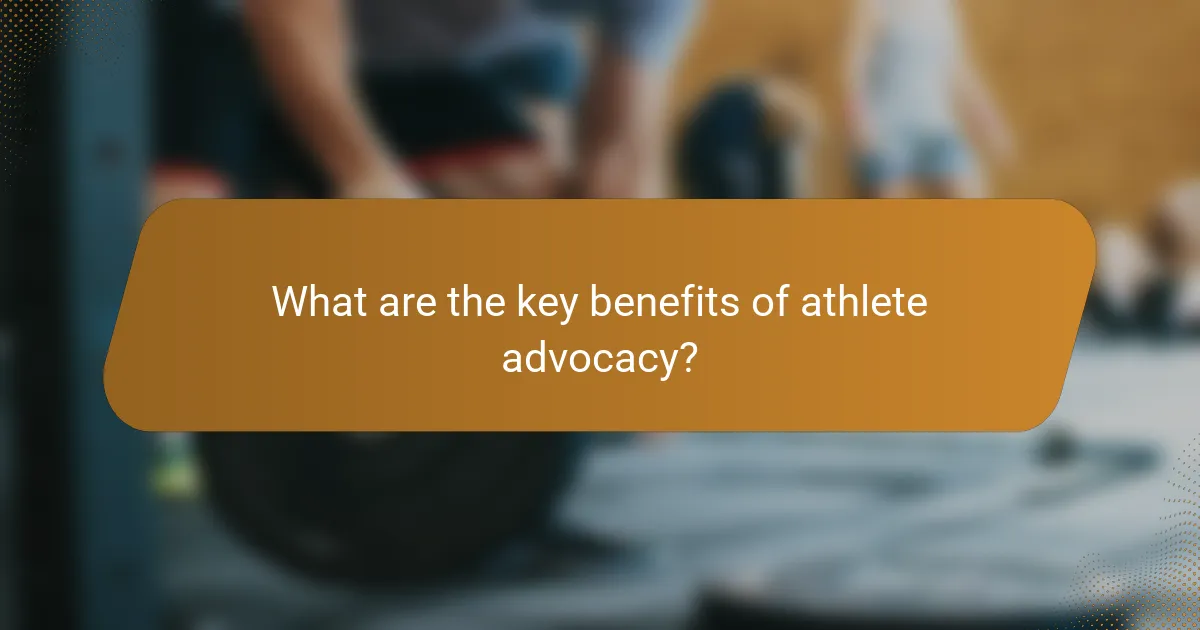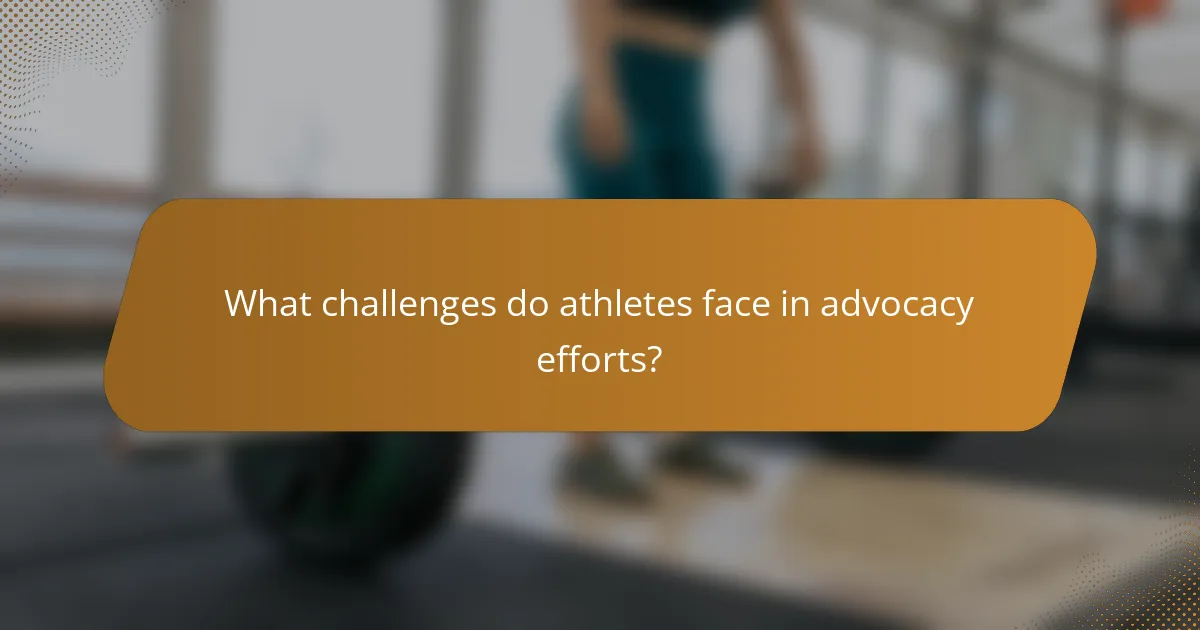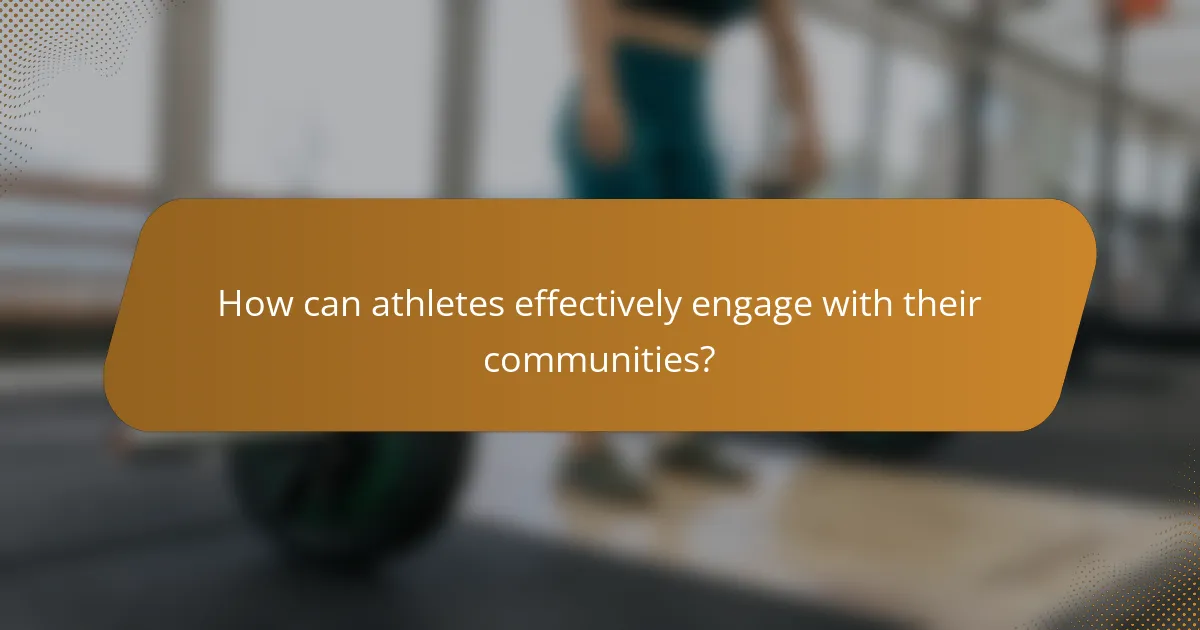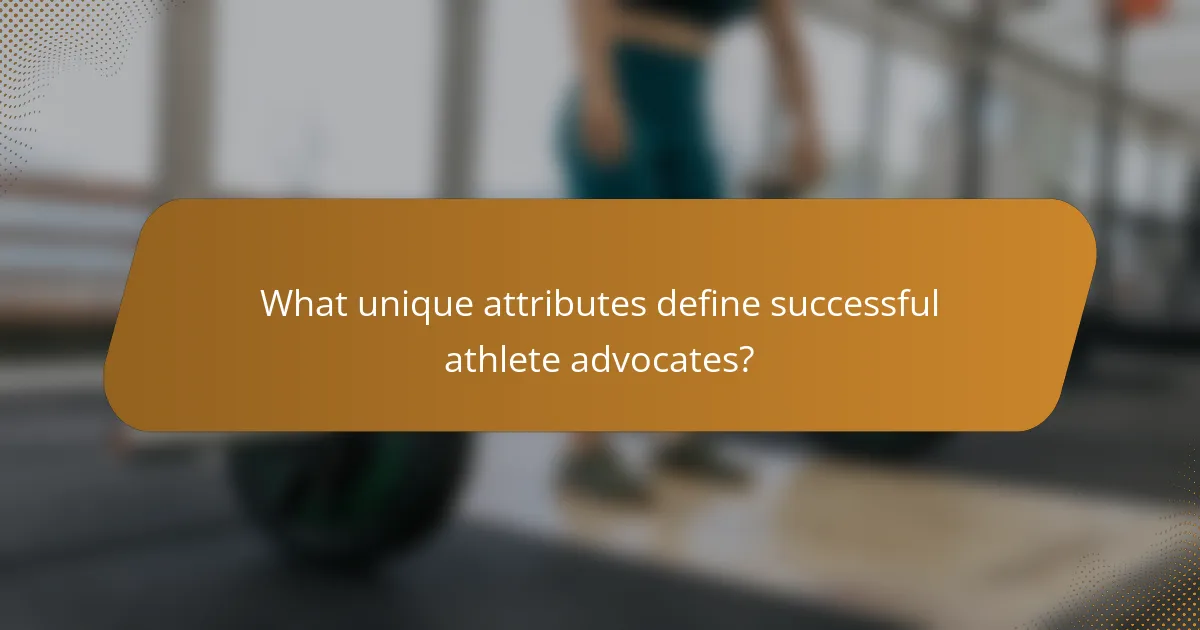Athlete advocacy enhances community support and raises awareness of social issues while promoting diversity in sports. However, athletes face challenges like public scrutiny and limited resources. Effective engagement strategies include mentorship and collaboration with local organizations. Successful advocates leverage personal experiences to inspire change and address critical issues such as mental health and social justice.

What are the key benefits of athlete advocacy?
Athlete advocacy provides numerous benefits, including increased awareness of social issues, enhanced community support, and improved mental health for athletes. It empowers athletes to use their platforms for positive change, fostering a sense of purpose and connection. Advocacy also promotes diversity and inclusion in sports, encouraging broader participation. Additionally, it can lead to policy changes that benefit athletes and their communities.
How does athlete advocacy enhance community health and wellness?
Athlete advocacy significantly enhances community health and wellness by promoting active lifestyles and raising awareness about health issues. Athletes often leverage their platforms to inspire positive behavioural changes and motivate community engagement in health initiatives. For instance, campaigns led by athletes can address mental health, nutrition, and physical fitness, fostering a culture of wellness. Additionally, athlete advocacy can bridge gaps in healthcare access, ensuring underserved communities receive necessary resources and support. This unique attribute of athlete advocacy creates a powerful impact by combining visibility with community-driven solutions.
Which social issues are addressed through athlete advocacy?
Athlete advocacy addresses various social issues, including racial equality, mental health awareness, and environmental sustainability. Athletes leverage their platforms to highlight these concerns, driving community engagement and policy changes. For example, initiatives like Black Lives Matter and mental health campaigns have gained significant traction through athlete involvement. This advocacy fosters a culture of awareness and action, influencing societal norms and encouraging dialogue on pressing issues.
What role does athlete advocacy play in promoting inclusivity in sports?
Athlete advocacy plays a crucial role in promoting inclusivity in sports by amplifying diverse voices. Advocates challenge systemic barriers and encourage policies that support underrepresented groups. This engagement fosters a more inclusive environment, enhancing community connections and participation rates. For example, initiatives led by athletes have increased visibility for marginalised communities, leading to greater acceptance and support. As a result, athlete advocacy significantly contributes to the ongoing transformation of sports culture, making it more accessible for everyone.

What challenges do athletes face in advocacy efforts?
Athletes face significant challenges in advocacy efforts, including public scrutiny, lack of support, and potential backlash. These obstacles can hinder their ability to address important social issues effectively. Public perception often influences how their messages are received, creating pressure to conform to expectations. Additionally, limited resources and institutional support can restrict athletes’ capacity to engage in meaningful advocacy. As a result, many athletes navigate complex dynamics to make their voices heard while managing their careers.
How do public perceptions impact athlete advocacy?
Public perceptions significantly influence athlete advocacy by shaping public support and engagement. Positive perceptions can enhance an athlete’s ability to effect change, while negative views may hinder their efforts. For example, athletes who are viewed as role models often have greater success in mobilising community support for social causes. Additionally, the media plays a crucial role in framing athletes’ actions, which can either bolster or undermine advocacy initiatives. As a result, fostering a positive public image is essential for athletes aiming to drive meaningful change.
What are the legal barriers athletes encounter when advocating for change?
Athletes face significant legal barriers when advocating for change, including restrictive contracts and potential retaliation. Many athletes are bound by contracts that limit their ability to speak out on social issues. Additionally, they may encounter backlash from sponsors or teams, which can lead to career repercussions. Legal protections for whistleblowers in sports are often inadequate, further complicating their efforts. These challenges can deter athletes from engaging in advocacy, despite the potential for positive societal impact.
Which personal sacrifices do athletes make for advocacy?
Athletes make significant personal sacrifices for advocacy, including time, financial resources, and emotional well-being. They often invest countless hours in raising awareness, which can detract from training and competition. Financially, they may forgo sponsorship deals that conflict with their advocacy causes. Additionally, athletes face emotional challenges, such as public scrutiny and backlash, which can affect their mental health. These sacrifices highlight their commitment to social issues and the communities they represent.

How can athletes effectively engage with their communities?
Athletes can effectively engage with their communities by leveraging their platform for advocacy, fostering relationships, and participating in local initiatives. They can create awareness around social issues, inspire youth through mentorship, and collaborate with organisations to address community needs. This engagement enhances their personal brand while fostering a sense of belonging and support among fans.
What strategies can athletes use to raise awareness on social issues?
Athletes can raise awareness on social issues through advocacy campaigns, social media engagement, and community outreach. These strategies leverage their platform to influence public opinion and inspire action.
Advocacy campaigns can include partnerships with nonprofits, where athletes use their visibility to promote specific causes. Social media allows athletes to share personal stories and relevant information, reaching a broad audience instantly. Community outreach involves organising events or participating in local initiatives that directly address social issues, fostering connections with fans and communities.
These strategies not only highlight important issues but also encourage fans to engage and take action, amplifying the impact of the athlete’s message.
Which platforms are most effective for athlete advocacy?
Social media platforms, particularly Instagram, Twitter, and TikTok, are most effective for athlete advocacy. These platforms enable athletes to reach wide audiences, share personal stories, and engage directly with fans. Instagram’s visual content fosters emotional connections, while Twitter facilitates real-time discussions. TikTok’s short-form videos allow athletes to convey messages creatively and authentically. These platforms empower athletes to raise awareness on issues, mobilise support, and build community.
How can collaboration with organisations enhance advocacy efforts?
Collaboration with organisations enhances advocacy efforts by amplifying athlete voices and expanding their reach. Partnering with established groups provides access to resources, expertise, and networks essential for effective campaigns. This collaboration can lead to increased visibility, more significant community engagement, and stronger support for causes. Additionally, organisations often have established credibility, which can bolster the trustworthiness of advocacy initiatives. Engaging with diverse stakeholders fosters a sense of unity and shared purpose, ultimately driving more impactful change in the sports community.

What unique attributes define successful athlete advocates?
Successful athlete advocates are defined by their unique ability to leverage personal experiences, social influence, and community engagement. They possess a strong commitment to social justice, often using their platform to raise awareness on critical issues. Their authenticity and relatability resonate with audiences, fostering trust and encouraging action. These advocates often have a deep understanding of the challenges faced by underrepresented communities, which enhances their effectiveness in advocacy efforts. Additionally, their unique attributes include resilience, charisma, and the ability to inspire change through storytelling.
Which skills are essential for effective advocacy?
Effective advocacy requires strong communication, leadership, and empathy skills. Advocates must articulate their message clearly, inspire others, and understand diverse perspectives. Building relationships within the community enhances trust and collaboration. Additionally, knowledge of relevant policies and issues is crucial for informed advocacy efforts.
How does personal experience shape an athlete’s advocacy approach?
Personal experience significantly influences an athlete’s advocacy approach by shaping their perspectives and motivations. Athletes often draw from their own journeys, using personal challenges to connect with communities facing similar issues. This unique attribute enhances their authenticity and relatability, fostering stronger engagement. For instance, an athlete who has overcome injury may advocate for mental health support, raising awareness effectively. Their lived experiences enable them to address specific community needs, driving impactful change.

What are some rare but impactful advocacy campaigns by athletes?
Some rare but impactful advocacy campaigns by athletes include initiatives addressing mental health, environmental sustainability, and social justice. One notable example is Olympic swimmer Michael Phelps, who has openly advocated for mental health awareness, sharing his own struggles to reduce stigma. Another is NFL player Colin Kaepernick, whose protests against racial injustice sparked a nationwide movement. Additionally, professional athletes like Lewis Hamilton have championed environmental issues, promoting sustainable practices within their sports. These campaigns often inspire community engagement and drive significant social change.
How have athletes leveraged their platforms during global crises?
Athletes have effectively leveraged their platforms during global crises by raising awareness and promoting social justice initiatives. Their influence fosters community engagement and inspires collective action.
Many athletes utilise social media to communicate messages of solidarity, share personal stories, and mobilise support for various causes. For instance, during the COVID-19 pandemic, athletes encouraged public health measures and supported frontline workers.
Additionally, athletes often collaborate with organisations to amplify their impact. These partnerships allow them to reach broader audiences and drive fundraising efforts for critical issues, such as racial equality and mental health awareness.
Despite facing challenges like backlash and scrutiny, athletes continue to advocate for change. Their unique position enables them to challenge societal norms and inspire fans to participate in community initiatives.
Which lesser-known initiatives have made a significant difference?
Lesser-known initiatives like the Athlete Ally and the Sports Diplomacy programme have made significant impacts. Athlete Ally promotes LGBTQ+ inclusivity in sports, while Sports Diplomacy uses sports as a tool for international relations. Both initiatives empower athletes and foster community engagement through advocacy and awareness campaigns.
What lessons can be learned from past advocacy successes and failures?
Past advocacy successes and failures teach valuable lessons about effective athlete engagement. Successful initiatives often demonstrate clear communication and alignment with community values. Challenges arise when advocacy efforts lack transparency or fail to address the concerns of diverse athlete groups. Collaborative strategies that involve athletes in decision-making processes enhance credibility and impact. Understanding past outcomes can guide future advocacy, ensuring it resonates with both athletes and their communities.
What best practices should athletes follow for effective advocacy?
Athletes should prioritise education, collaboration, and authenticity for effective advocacy. Educating themselves on issues enhances credibility. Collaborating with organisations amplifies voices and resources. Authenticity builds trust with audiences and stakeholders. Engaging in community initiatives fosters connections and promotes shared values.
